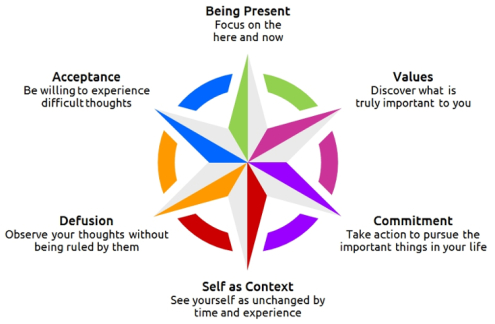A particularly useful approach to psychotherapy that is helpful for clients of diverse ages with a variety of concerns is Acceptance and Commitment Therapy (ACT). ACT is a type of mindfulness and acceptance-based behavioral therapy. What sets ACT apart from traditional cognitive and behavioral therapies is that ACT does not focus on reshaping negative thoughts. Instead, ACT is based on the belief that trying to disprove or argue against negative thoughts actually makes them more, rather than less intrusive. For this reason, ACT focuses on changing our relationship with our thoughts by simply observing and separating from them rather than engaging with them.
ACT also combines Eastern philosophies used successfully for thousands of years to help people cultivate self-awareness, live fully in the present moment (mindfulness), accept rather than struggle against pain in life, and act on our innermost values rather than our negative emotions.
Put simply, Acceptance and Commitment Therapy focuses on:
Accepting difficult thoughts and feelings
Connecting with what is important to you in life (your values)
Taking action towards your values
Society tells us that a good life is pain-free and that happiness is the ultimate goal. We are told that we can control unhappy feelings and that if we don’t, we have failed or not tried hard enough. In truth, we all experience the full range of human emotions, and pain is an inevitable and shared human experience. In light of life’s inherent difficulties, the blind pursuit of happiness is a straw man that can only lead to unhappiness.
One of the most important aspects of ACT is the following equation:
Pain + Struggle = Suffering
According to ACT, we cannot avoid pain in life, and struggling against pain merely adds suffering to the equation. ACT’s focus on accepting pain while enhancing values-based living, leads us to more adaptive coping strategies that lessen our suffering and move us towards a richer, more fulfilling life.
When we experience distressing thoughts, feelings, and sensations, our immediate impulse is to try to avoid or control these experiences, which can lead to unhealthy coping behaviors such as withdrawal, aggression, substance abuse, and self-harm. These behaviors, often aimed at dulling the pain, may provide temporary relief; however, they typically conflict directly with what we value in life, causing more pain and suffering in the long run.
In practice, ACT helps us cultivate acceptance and the willingness to experience whatever thoughts, feelings, and urges come up while at the same time taking the steps to pursue what we value, and what adds meaning to our lives. It helps us realize that we can accept instead of struggle against the inevitable difficulties of life without losing sight of our ability to act on what means most to us.
Warm regards,
Nikki Barefoot, PsyD
ACT Resources to Explore

- The Happiness Trap: How to Stop Struggling and Start Living: A Guide to ACT
- Get Out of Your Mind and Into Your Life: The New Acceptance and Commitment Therapy
- Get Out of Your Mind and Into Your Life for Teens: A Guide to Living an Extraordinary Life
- The Mindfulness and Acceptance Workbook for Anxiety: A Guide to Breaking Free from Anxiety, Phobias, and Worry Using Acceptance and Commitment Therapy
- The Mindfulness and Acceptance Workbook for Depression: Using Acceptance and Commitment Therapy to Move Through Depression and Create a Life Worth Living
- Finding Life Beyond Trauma: Using Acceptance and Commitment Therapy to Heal from Post-Traumatic Stress and Trauma-Related Problems

